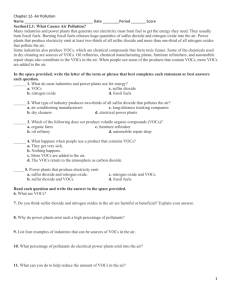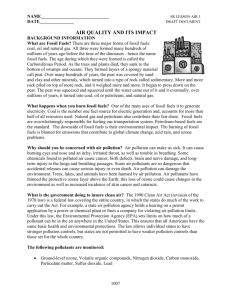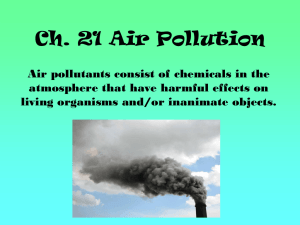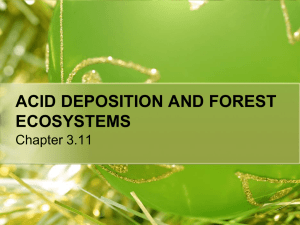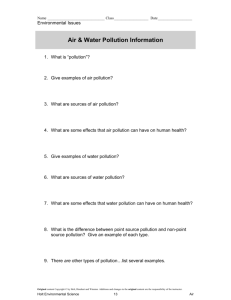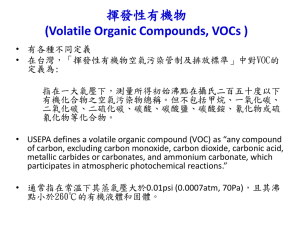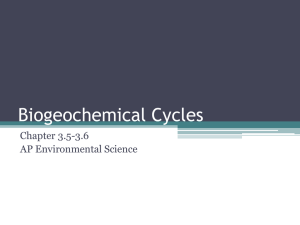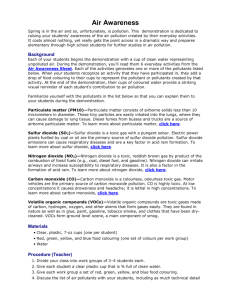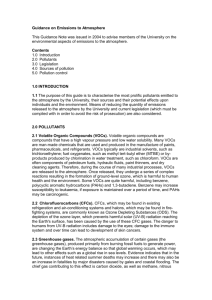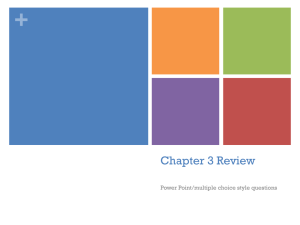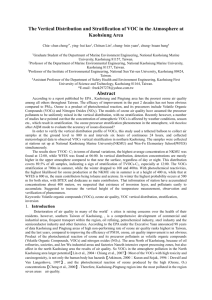Air Pollution Causes Worksheet: Environmental Science
advertisement
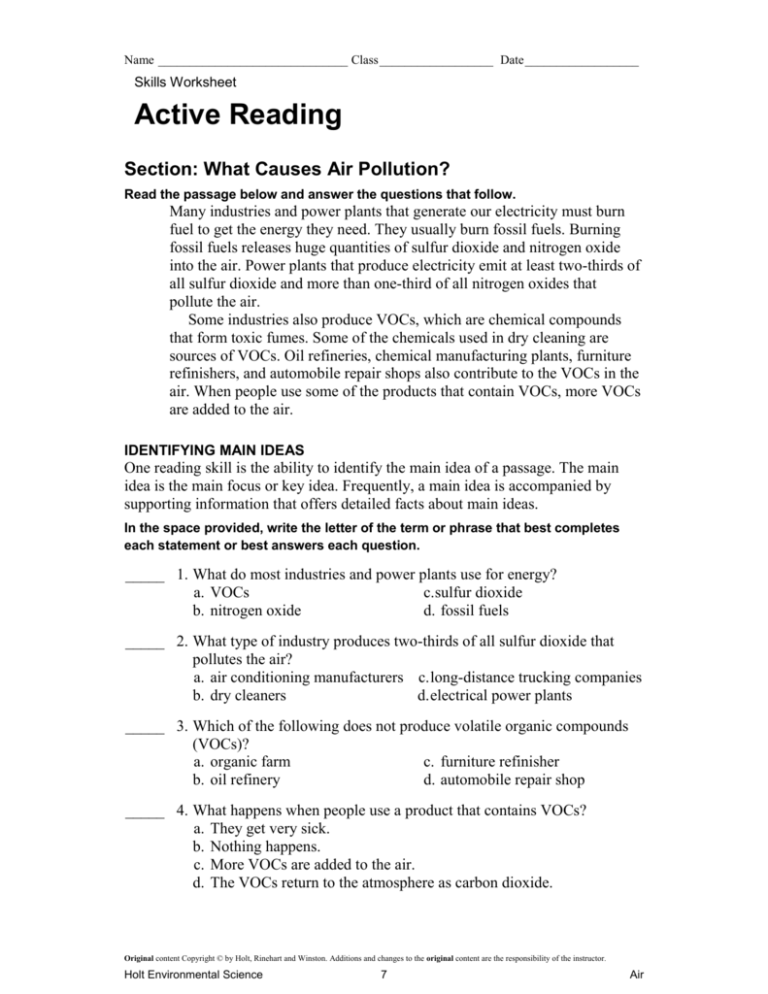
Name ______________________________ Class __________________ Date __________________ Skills Worksheet Active Reading Section: What Causes Air Pollution? Read the passage below and answer the questions that follow. Many industries and power plants that generate our electricity must burn fuel to get the energy they need. They usually burn fossil fuels. Burning fossil fuels releases huge quantities of sulfur dioxide and nitrogen oxide into the air. Power plants that produce electricity emit at least two-thirds of all sulfur dioxide and more than one-third of all nitrogen oxides that pollute the air. Some industries also produce VOCs, which are chemical compounds that form toxic fumes. Some of the chemicals used in dry cleaning are sources of VOCs. Oil refineries, chemical manufacturing plants, furniture refinishers, and automobile repair shops also contribute to the VOCs in the air. When people use some of the products that contain VOCs, more VOCs are added to the air. IDENTIFYING MAIN IDEAS One reading skill is the ability to identify the main idea of a passage. The main idea is the main focus or key idea. Frequently, a main idea is accompanied by supporting information that offers detailed facts about main ideas. In the space provided, write the letter of the term or phrase that best completes each statement or best answers each question. _____ 1. What do most industries and power plants use for energy? a. VOCs c.sulfur dioxide b. nitrogen oxide d. fossil fuels _____ 2. What type of industry produces two-thirds of all sulfur dioxide that pollutes the air? a. air conditioning manufacturers c. long-distance trucking companies b. dry cleaners d. electrical power plants _____ 3. Which of the following does not produce volatile organic compounds (VOCs)? a. organic farm c. furniture refinisher b. oil refinery d. automobile repair shop _____ 4. What happens when people use a product that contains VOCs? a. They get very sick. b. Nothing happens. c. More VOCs are added to the air. d. The VOCs return to the atmosphere as carbon dioxide. Original content Copyright © by Holt, Rinehart and Winston. Additions and changes to the original content are the responsibility of the instructor. Holt Environmental Science 7 Air Name ______________________________ Class __________________ Date __________________ Active Reading continued _____ 5. Power plants that produce electricity emit a. sulfur dioxide and nitrogen oxide.c. nitrogen oxide and VOCs. b. sulfur dioxide and VOCs. d. fossil fuels. Read each question and write the answer in the space provided. 6. What are VOCs? _______________________________________________________________ 7. Reread the first four sentences of this passage. Given this information, do you think sulfur dioxide and nitrogen oxides in the air are harmful or beneficial? Explain your answer. _______________________________________________________________ _______________________________________________________________ RECOGNIZING CAUSE AND EFFECT One reading skill is the ability to recognize cause and effect. Read each question and write the answer in the space provided. 8. Why do power plants emit such a high percentage of pollutants? _______________________________________________________________ _______________________________________________________________ _______________________________________________________________ 9. List four examples of industries that can be sources of VOCs in the air. _______________________________________________________________ _______________________________________________________________ _______________________________________________________________ 10. What percentage of pollutants do electrical power plants emit into the air? _______________________________________________________________ _______________________________________________________________ _______________________________________________________________ 11. What can you do to help reduce the amount of VOCs in the air? _______________________________________________________________ _______________________________________________________________ _______________________________________________________________ Original content Copyright © by Holt, Rinehart and Winston. Additions and changes to the original content are the responsibility of the instructor. Holt Environmental Science 8 Air TEACHER RESOURCE PAGE 18. Accept any reasonable response. Sample answer: The power plants in Country A give off oxides of sulfur and nitrogen that combine with water in the air to make acid precipitation. The wind carries the acid precipitation over the border away from Country A, and it falls into Country B, where it acidifies the lake water. The two countries could reach an agreement for Country A to install scrubbers in the power plants, or take other measures to reduce emissions. 19. Accept any reasonable response. Sample answers: Agree. It would be impossible to maintain our society without any pollution. Many businesses would fail, and many people would lose their jobs if businesses were banned from producing any pollution. Even non-industrialized societies produce pollution in the form of smoke from fires. It makes more sense for our society to work toward drastically reducing pollution rather than completely eliminating it. SECTION: AIR, NOISE, AND LIGHT POLLUTION 1. 2. 3. 4. 5. 6. 7. 8. 9. 10. 11. 12. 13. 14. c d b a long, thin fibers that are valued for their strength and resistance to heat a potentially fatal disease that arises from exposure to asbestos 2 1 5 3 6 4 Asbestos is a good insulator and fire retardant. Exposure to asbestos can lead to the disease asbestosis, which can be fatal. School officials don’t want to take the chance that a child might inhale asbestos fibers. SECTION: ACID PRECIPITATION Active Reading 1. 2. 3. 4. 5. SECTION: WHAT CAUSES AIR POLLUTION? 1. 2. 3. 4. 5. 6. 7. 8. 9. 10. 11. d d a c a chemical compounds that form toxic fumes Harmful; they pollute the air. They burn fossil fuels, which releases huge amounts of sulfur dioxide and nitrogen oxides into the air. oil refineries, chemical manufacturing plants, furniture refinishers, and automobile repair shops two-thirds of all sulfur dioxide and more than one-third of all nitrogen oxides that pollute the air use fewer products that contain VOCs 6. 7. 8. 9. 10. 11. 12. 13. 14. c d c rain, sleet, and snow The author writes “power of hydrogen” in parentheses to explain what the letters in pH stand for. how acidic or basic a substance is 2 4 3 6 1 5 It is more basic; it is more acidic. the burning of fossil fuels; decline or loss of plant and animal populations Map Skills 1. 2. 3. 4. low Barnstable over cities, especially over Boston Answers may vary but should mention that air pollution concentrations are higher over cities. 5. Answers will vary. Original content Copyright © by Holt, Rinehart and Winston. Additions and changes to the original content are the responsibility of the instructor. Holt Environmental Science 94 Air
